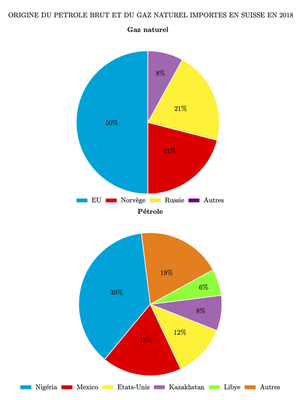How do we ensure our security of supply of petroleum products and natural gas?
More than two-thirds of our final energy needs are now met by fossil fuels. All of this fossil energy comes from abroad. This means that Switzerland would be faced with very serious problems in the event of a supply disruption. However, Switzerland is pursuing a diversification strategy that enables it to minimise this risk.
Historically, our country has never experienced a situation that seriously threatened the security of its energy supply, except during World War II. However, at any time, this security may be compromised, as a result of major conflicts, economic and political crises, or natural or man-made disasters. Establishing mandatory strategic stocks constitutes a partial response of last resort to these risks [→ Q22]. To ensure the highest possible security of supply, Switzerland has developed a range of measures, including a three-level diversification policy.
First, by diversifying imported products. Switzerland buys about 60% of its oil in the form of finished products (petrol, diesel, oil, kerosene), and about 40% in the form of crude oil, which it refines at its two refineries in Collombey (Valais) and Cressier (Neuchâtel). Despite their modest refining capacity relative to large European refineries (which makes them more difficult to make profitable), both refineries are of vital strategic importance to Switzerland, as they significantly reduce our dependence on the European Union, which supplies us with all of the finished petroleum products we import.
Second, by diversifying our sources of supply. Our crude oil imports come from countries of the former Soviet Union (mainly Kazakhstan), as well as from north and west Africa (currently Libya, Nigeria, Algeria) [→ see figure below]. When the Libyan crisis erupted in 2011, Switzerland managed, within a few weeks and without impact on the consumer, to compensate for the cessation of imports from that country (which was then our main supplier of crude oil), with imports from countries of the former Soviet Union, in the meantime tapping various existing reserves. Switzerland has also diversified the origin of finished products from crude oil (petrol, diesel, fuel oil, kerosene). They come from refineries in the Netherlands, Belgium, Luxembourg, France, Germany and Italy.
More than 60% of natural gas comes from western European countries (Norway, Germany, the Netherlands, France and Italy). The rest comes from Russia and north Africa. Finally, Switzerland favours suppliers with large storage capacities and large reserves. It should be noted that Switzerland has not entered into any gas supply contracts with Russia. The gas from Russia delivered to Switzerland is actually purchased from Germany, with substitution clauses in the event of a failure of Russian supplies; the Germans undertake to draw from their own stocks any gas destined for Switzerland that is not delivered by Russia.
Third, by diversifying the routes and means of transport used. Almost 50% of oil products reach Switzerland by pipeline, around 25% by barge on the Rhine, around 20% by rail (tanker-wagons), and between 5% and 10% by road (tanker-trucks). With the exception of crude oil (which comes to us exclusively by pipeline), each of these means of transport can be substituted for another if necessary. With regard to natural gas, it arrives in Switzerland via gas pipeline networks, following a dozen different routes. Moreover, due to its central location, Switzerland is on an important north-south transit route for natural gas. Furthermore, it is connected via its network to more than 100 underground storage facilities in western Europe.
In addition to this policy of diversification, commercial guarantees are also provided: the majority of purchases are made on the basis of long-term, non-interruptible and renewable contracts. Politically, Switzerland is a member of the International Energy Agency in Paris, one of whose missions is to take international action in the event of a major energy crisis.

References
- Erdöl-Vereinigung - Union Pétrolière (2018)
- Erdöl-Vereinigung - Union Pétrolière (2018). Rapport annuel 18.
- Office fédéral pour l'approvisionnement économique du pays (OFAE) (2012)
- Office fédéral pour l'approvisionnement économique du pays (OFAE) (2012). Le gaz naturel et la sécurité de l’approvisionnement en Suisse.
- Rossier (2012)
- Rossier, R. (2012). Energie Relations commerciales sous tension - Odeurs de pétrole - Un quart de tout l’or noir consommé en Suisse provient du Kazakhstan et de l’Azerbaïdjan. La Tribune de Genève.